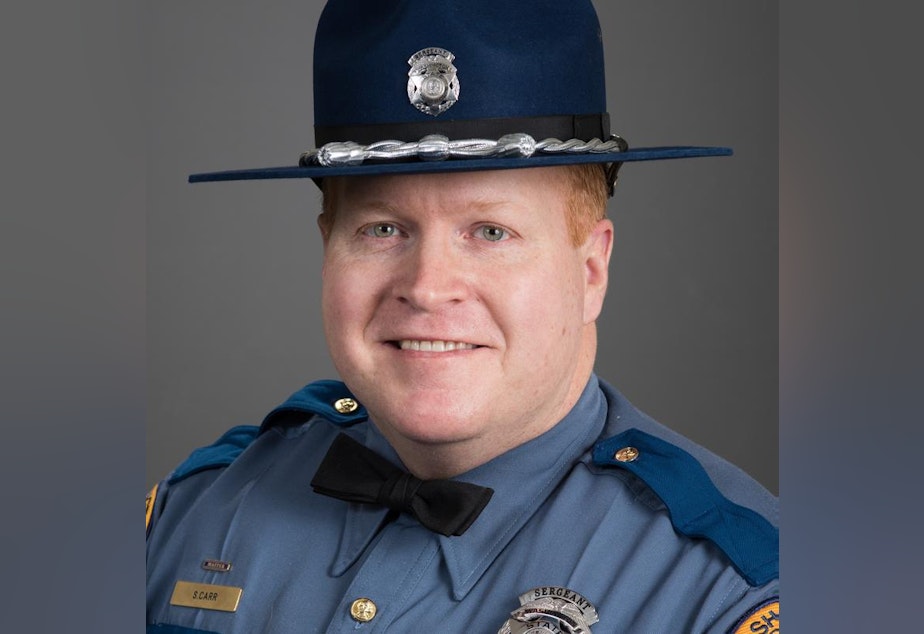Former Washington State Patrol sergeant stripped of right to carry a badge

A former sergeant in the Washington State Patrol was stripped of his state peace officer certification on Wednesday over allegations he carried out a sexual affair with a woman while on duty, including two encounters a state hearings panel deemed nonconsensual.
The state Criminal Justice Training Commission (CJTC)’s decision on Wednesday in the case of Sean M. Carr, who resigned from the patrol last July, effectively bars him from again serving as a police officer in Washington.
Carr’s case represented a test of Washington’s narrow criteria to take away an officer’s badge and gun. Since Carr’s case was heard last month, the state Legislature passed a bill to significantly broaden the circumstances for decertification. It was signed by Gov. Jay Inslee, and takes effect in July.
In its final order, the CJTC said Carr’s conduct constituted the crimes of failure of duty and official misconduct by, among other things, “intentionally choosing to pursue his own sexual gratification rather than use his on-duty time to perform his lawful responsibilities as a peace officer.”
Carr, who is the son-in-law of WSP Chief John Batiste, denied having any nonconsensual sex.
Sponsored
The state’s system for decertification, in place since 2003, has served as an anemic check on officer misconduct. Washington has about 11,000 certified officers at any given time, and the state has only decertified about 230 officers in nearly two decades. At least six officers have lost their licenses due to on-duty sex, including Carr. One had his case overturned on appeal.
Under the new law, the CJTC will be able to revoke an officer’s certification for a broad swath of behavior including conduct that “fails to meet the ethical and professional standards of a peace officer.”
But Carr’s case was heard under the current rules, which required the commission to find that his on-the-job behavior rose to the level of “official misconduct” and constituted a crime “committed under color of authority as a peace officer.”
Carr’s attorneys argued that the state failed to meet that high bar. In pleadings, attorneys Ted Buck and Nick Gross cited the narrowness of the existing law and said there was no “legal basis to decertify” Carr.
“The Hearings Panel appears to have adopted an interpretation of Official Misconduct and Failure of Duty that is so broad it would apply to any officer who engages in any kind of personal activity while on duty,” Gross said in an email Wednesday, after the order was released.
Sponsored
In their decision to decertify Carr, the five-member panel noted that Carr admitted to the majority of sexual misconduct allegations, including sending sexually explicit videos while in uniform and having sex while on duty. He also admitted to leaving his assigned patrol area in anticipation of meeting the woman for sex, the panel found. She was unnamed in official proceedings.
“While the Panel would revoke Mr. Carr’s peace officer certification based solely upon the misconduct that he has admitted to, this case is particularly disturbing due to the nonconsensual nature of two of Mr. Carr’s sexual interactions” with the woman, the decision reads. “Certified peace officers are entrusted with a position of power and responsibility in society.”
The decision was signed by the panel’s presiding member, Kitsap County Sheriff Gary Simpson. Besides Simpson, the panel included three other law enforcement officers and a criminal justice professor from Seattle University.
The charges against Carr stemmed from an off-and-on affair he had with a former civilian employee of the State Patrol that lasted from 2012 to 2017.
“This was not an isolated incident, but showed a pattern of repeated dishonesty, deceit, and untruthful activity committed in his official capacity as a certified peace officer,” the panel wrote.
Sponsored
Carr denied the woman’s allegations that he had coerced her to have sex or ever used physical force against her. She claimed that on one occasion he grabbed and bruised her arm while trying to persuade her to perform a sex act. The woman told investigators she was raped.
In 2019, the Thurston County Sheriff’s Office investigated the allegations and recommended Carr be charged for rape. But the woman was unwilling to testify and prosecutors decided not to pursue the case.
Carr’s case was particularly sensitive for the State Patrol because of his relationship to Batiste, the longtime chief of the Patrol. Carr is married to Batiste’s daughter, who is also a state trooper. To avoid a conflict of interest, the WSP “walled-off” the chief from the investigation.
Following the criminal investigation, the State Patrol conducted its own internal review of Carr’s conduct and found that he had violated internal policies. Before the Patrol could decide whether to fire him, Carr resigned.
Stripped of his badge and gun, but still armed with his state peace officer certification, there was nothing to prevent Carr from seeking employment with another police agency. In fact, during the CJTC hearing, a Thurston County detective said that Carr had applied to become an officer with the Fife Police Department. Ultimately, he wasn’t hired.
Sponsored
Carr testified during the hearing that his goal was to return to law enforcement.
But now that his certification has been revoked, Carr can no longer serve as an officer with any department in the state. He does, however, have the right to appeal the ruling to a judge. Gross, his attorney, said, “We will evaluate all options going forward.”
State law also allows officers to petition the CJTC for reinstatement after five years.
